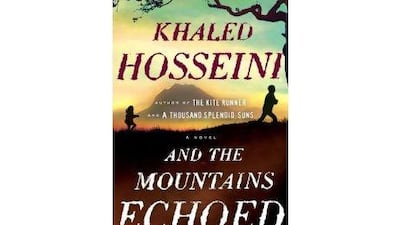Khaled Hosseini, whose novels have sold more than 38 million copies worldwide, knows what a lucky man he is.
“What separates me from someone in the streets of Kabul is such a thin line,” says the Afghan-American author of The Kite Runner and A Thousand Splendid Suns. “What I have is, in many ways, an undeserved gift.”
His amazing run continued on Tuesday night as he appeared before an overflowing crowd at a bookshop in New York City. With some 300 people seated before him, and dozens more watching on a video screen a floor below, Hosseini spoke for about 40 minutes about his new novel, And the Mountains Echoed.
The book, which was published this week, will likely become one of the summer’s favourite reads. It has received admiring reviews and reached the Top 10 on Amazon well before its official release.
Hosseini, 48, is slightly greyer since A Thousand Splendid Suns came out six years ago. He was relaxed and chatty at the reading, not surprising for a man who turned up to the reading in a checked shirt and jeans, as if dropping in on a neighbour for a visit.
Like his previous novels, And the Mountains Echoed features Afghan characters and tells a story about families, this one spanning decades and generations. The title was inspired by a William Blake line, “And all the hills echoed,” with “hills” changed to “mountains” to suit Afghanistan’s imposing terrain. Hosseini didn’t know what the book would be called when he began it, but he did have an image in his mind that had struck him like a “thunderclap” – a man walking across the desert, pulling a wagon behind him, with a 3-year-old girl inside. A boy, about 10, trails them.
“Something about that particular dynamic and image seemed to me so striking and compelling,” he said. Determined to know more about these people, he decided the children were siblings, “that they guilelessly adore each other and something difficult is going to happen” in Kabul. He would call the boy Abdullah, and the girl Pari. He would, once again, draw upon old memories of Afghanistan, a country he left as a child.
Hosseini considers the book his most ambitious, with a complex narrative and stops in Paris, San Francisco (the author lives in California) and Greece. He had no idea how the novel would turn out when he started and considers it far harder to describe than A Thousand Splendid Suns, which he summarises as “the struggles of women in Afghanistan over the past 30 years”. But he does know what he wanted to express – how we all are united by loss, by failure, by what we’re missing.
“Life just doesn’t care about our aspirations, or sadness,” he said. “It’s often random, and it’s often stupid and it’s often completely unexpected and the closures and the epiphanies and revelations we end up receiving from life, begrudgingly, rarely turn out to be the ones we thought [we’d have].”
Few authors have enjoyed so many nice surprises. Ten years ago, Hosseini was a doctor who had written stories all of his life but never thought anyone wanted to read them. He was a doctor because he had been poor when his family first moved to the US and he never wanted to be poor again. He wrote The Kite Runner out of love, with no plans to publish it, only to see the novel become a word-of-mouth sensation after its 2003 release.
“I more or less stumbled into a writing career,” he said, adding that he was happy to give up medicine. (Meanwhile, he has set up a foundation that provides humanitarian assistance in Afghanistan.)
Asked by an audience member which books he had been reading, he mentioned the short story writers George Saunders and Alice Munro. A woman wanted to know how Hosseini was able to get inside the minds of female characters (“I watched a lot of The View,” he replied, to much laughter. “I don’t think I ever did tap into what women think. I’m as clueless as any guy in this room.”) The inevitable question about how one becomes a writer was asked by an eighth grader.
“My advice to you is to read a lot,” he said. “And just write, write all the time.”
Follow us
And follow us on Facebook for discussions, entertainment, reviews, wellness and news.

